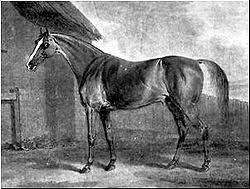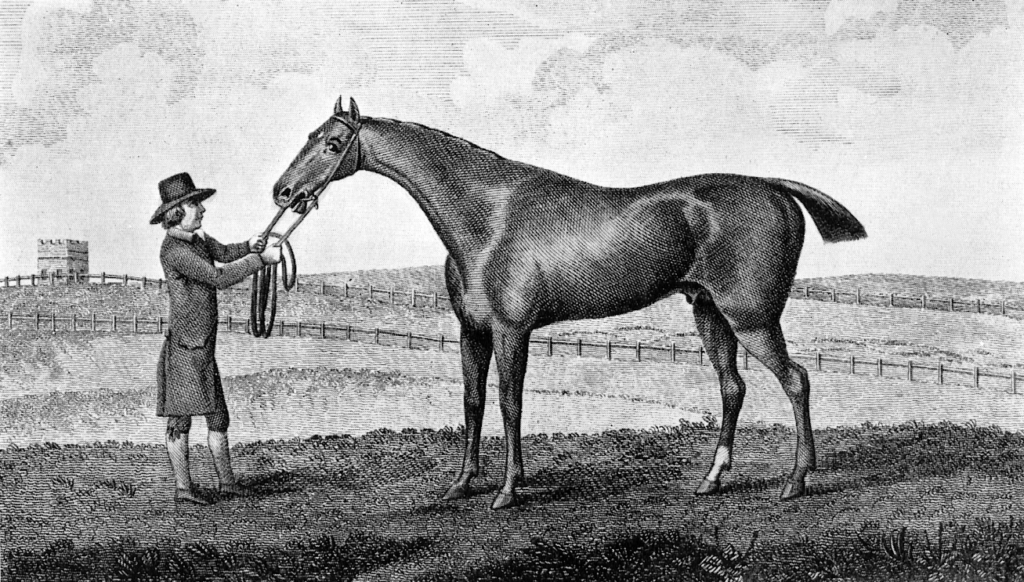Waxy by Potoooooooo
descendants of Eclipse
ECLIPSE (ch.c. 1764), was the stand-out horse of the century.
Bred by William, Duke of Cumberland and named after the great eclipse in the year of his birth, he won all his 18 races including 11 King’s Plates, before dying of colic at Cannons, in Middlesex, on 27 February, 1789. No racehorse has achieved greater fame or left a more lasting legacy through his progeny. Now, 234 years after his death, more than 95 per cent of all modern thoroughbreds can trace back to him in male line.
One of the best sons of Eclipse was Pot-8-o’s.
However, this was given a twist when Lord Abingdon asked the lad to chalk up the colt’s name, Potatoes, on the stable door. The lad spelt it Potoooooooo, which so surprised and delighted Lord  Abingdon that he registered it as such. Later, for everyone’s convenience it was shortened to Pot-8-o’s. As it turned out, he won 30 races, including 28 at Newmarket – an all-time British record for most wins at one course. Pot-8-o’s raced and won to the age of nine, before siring three Derby winners and six of the 13 runners in Waxy’s Derby of 1793.
Abingdon that he registered it as such. Later, for everyone’s convenience it was shortened to Pot-8-o’s. As it turned out, he won 30 races, including 28 at Newmarket – an all-time British record for most wins at one course. Pot-8-o’s raced and won to the age of nine, before siring three Derby winners and six of the 13 runners in Waxy’s Derby of 1793.
Waxy then continued the line as Pot-8-o’s best offspring.
Bred by Sir Ferdinando Poole and born a bay colt in 1790, Waxy was described as “a beautiful, lengthy horse, with a lot of Arab in his appearance”.
By Pot-8-o’s out of Maria by Herod, Waxy is an excellent example of the Eclipse/Herod cross, which proved so influential in early Thoroughbred breeding.
 The racing career of Waxy (above) is entwined with that of his arch rival Gohanna (b.c. 1790).
The racing career of Waxy (above) is entwined with that of his arch rival Gohanna (b.c. 1790).
The Derby betting of 10-11 Gohanna, 8-1 bar, made it look a one-horse-race, and Gohanna tried to make it so. He led from soon after the start until rounding Tattenham Corner, where Waxy, to the surprise of the crowd, went on and kept his head in front all the way up the straight to win by half a length.
After such a battle, the principals had to meet again, but everyone had to wait until the Jockey Club Plate at Newmarket the following year. The result was the same but Sam Arnull, Gohanna’s jockey, would not accept defeat and suggested a match the following day. After much deliberation, a match was made for 100 guineas, Gohanna to receive 3 1b. This time, Gohanna won by a head, but later in the year, at Lewes, Waxy beat Gohanna again. In 1796, they both contested the King’s Plate at Guildford, run in four-mile heats. Waxy won the first heat by a short head, the second was a dead-heat and in the final heat Waxy won by half a length. What a field day the modern media would have with events like these!
Waxy’s final race record reads: won 11 races incl. the Derby Stakes, Jockey Club Plate and 4 King’s Plates.
Gohanna was bred on similar lines to Waxy, i.e. sire by Eclipse and dam by Herod. He was foaled at Petworth in Sussex and named after a hill nearby. A small horse himself, his progeny rarely exceeded 15.1 hands but he sired 151 winners, including two in the Derby, Cardinal Beaufort (1805) and Election (1807).
Waxy proved even better at stud, siring 190 winners headed by Derby heroes Pope (1809), Whalebone (1810), Blucher (1814) and Whisker (1815). Champion Sire in 1810, he died in April 1818 in his 28th year and was buried close to All Saints Church in Newmarket. Gohanna also died in April, but three years earlier, and was buried at Petworth.
For more horseracing history – see MICHAEL’S BOOKS & CHARTS FOR SALE